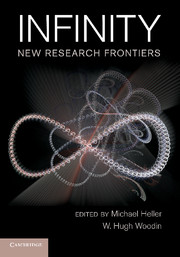Book contents
- Frontmatter
- Contents
- Contributors
- Preface
- Acknowledgments
- Introduction
- I Perspectives on Infinity from History
- 1 Infinity as a Transformative Concept in Science and Theology
- II Perspectives on Infinity from Mathematics
- III Technical Perspectives on Infinity from Advanced Mathematics
- IV Perspectives on Infinity from Physics and Cosmology
- V Perspectives on Infinity from Philosophy and Theology
- Index
- References
1 - Infinity as a Transformative Concept in Science and Theology
Published online by Cambridge University Press: 07 June 2011
- Frontmatter
- Contents
- Contributors
- Preface
- Acknowledgments
- Introduction
- I Perspectives on Infinity from History
- 1 Infinity as a Transformative Concept in Science and Theology
- II Perspectives on Infinity from Mathematics
- III Technical Perspectives on Infinity from Advanced Mathematics
- IV Perspectives on Infinity from Physics and Cosmology
- V Perspectives on Infinity from Philosophy and Theology
- Index
- References
Summary
Introduction
As finite human beings in space, time, and matter, our thinking and feeling about infinity have always been associated with religious awe, whether in terms of wondering, being frightened, or being inspired. In this sense, infinity has a very strong affective-emotional component. At the same time, infinity is a scientific concept, and it has a strong intellectual-rational component that is mostly intertwined with a kind of intuitive and even ecstatic grasp of the infinite God. The affective-emotional component is emphasized in many records. One of the most famous is the text of Blaise Pascal (1623–62). He was writing when modern Europe, with its drive for infinite scientific progress, was about to emerge.
If I consider the short period of time in which my life is intertwined with the eternity preceding and following it, and if I consider the small space in which I dwell, and if I consider just that which I see, which is lost in infinite space, of which I know nothing, and which knows nothing of me, then I am struck with wonder that I live here and not there.
(Pascal 1978, pp. 114–15)However, the rational structure of infinity still needs to be clarified. Many philosophers and mathematicians have struggled to give a rational account of infinity. The most famous quotation derives from the German mathematician David Hilbert (1862–1943).
- Type
- Chapter
- Information
- InfinityNew Research Frontiers, pp. 19 - 52Publisher: Cambridge University PressPrint publication year: 2011
References
- 5
- Cited by



